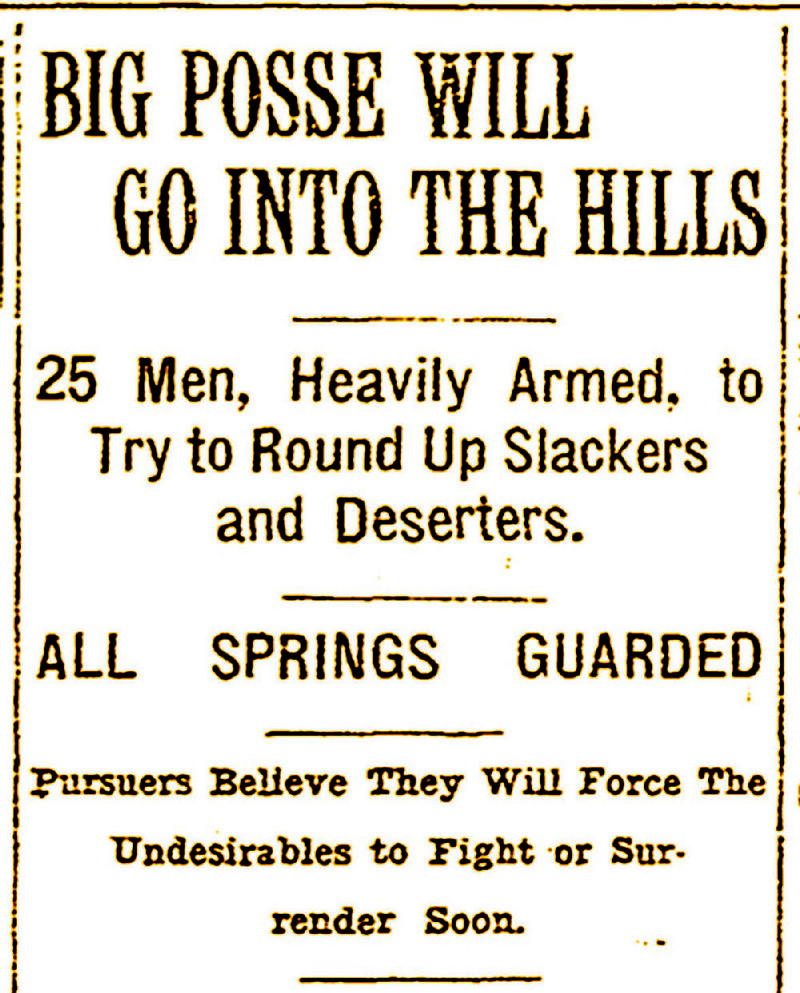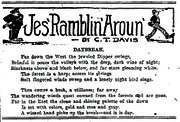In summer 1918, with the U.S. calling up wave after wave of men for service in the Great War, draft avoiders and deserters were Public Enemy No. 1, and the public was sure the hills were alive with slackers.
Law officers and posses went after them in five episodes that came to be called the Arkansas Draft Wars.
Jack Schnedler wrote about these small expeditions July 22 in the Arkansas Democrat-Gazette's Perspective section -- look that up if you haven't read his account yet. You'll want some context for today's Old News, which is nothing but an excerpt from a long account reporter/poet Charles T. Davis wrote about posse action in Logan County for the Aug. 11, 1918, Arkansas Gazette.
His descriptions during the first slacker roundup in May had so offended investors at Mount Ida they had dragged him back for a guided tour of Montgomery County. He got a funny story out of that, retracting nothing. But his later reports were more cautious.
Can you see below any evidence of a chastened reporter?
What follows is all from Davis' article, so we won't mess about with quotation marks or italics.
...
There is a peculiar situation in Logan county up about the northern slopes of Mount Magazine and on around in the eastern foothills. There are at least two gangs, very probably more, defying arrest at the hands of the largest posse that has ever operated in the county; and what their real reason for resisting arrest is, no one knows. Presumably they are evading the selective service regulations. ... Still, it cannot be said with certainty that any of the present gang are draft resisters. No one who has seen them knows them. ...
Every mountain farm house in the region has been visited, and everywhere, possemen say, there is found unswerving loyalty to the big cause, and wholehearted denunciation of the gangs, which are staining the county's escutcheon, and an eager willingness to help. The protestation of good faith is not lip service. When a man in humble circumstances -- and the long summer drouth has given them all that status -- will hike with the posse all day and then bring them all home to dinner with him, the whole 20 or more hungry men; when he will rustle up the last of his cut wood and cook -- by proxy held by his wife -- the last of his corn meal and side meat that the officers may breakfast, and take the covers of his own bed to shelter them from the weather, and all without charge -- he has given indubitable earnest of his good faith. And yet‚ somebody in the mountains is feeding the slackers, also. ...
The whole proposition reduces back to the mountains. Where there are mountains, Arkansas or elsewhere, there is isolation, where there is isolation there is ignorance, where there is ignorance there is lawlessness.
And here may be inserted, as well as in any other place, that nothing herein is intended in derogation of the mountain people, the loyal mountain people. No one who has the slightest knowledge of them, much less one who has camped with them, hiked with them, slept out in the open with them, partaken of their unstinting hospitality and, it is hoped, won their confidence fairly and in fairness, may gainsay their sterling qualities. Exteriorly they may be rough as the bark of the pine, but they are straight as its towering stem. Chivalry lives with them and the unborn kindliness which makes for a courtesy of the heart far beyond the cultivated courtliness of prescribed etiquette. The winds of the high heavens winnow the chaff from them and in the crucible of hard living the dross is burned away. There is no place in the mountains for the sensualist not the sybarite.
To those who rise to the clean, high standards of the mountains, this story is tribute in their honor. To those who fall, or who have never attempted to measure to the demand, this story is a simple statement of existing things. If there are uncomplimentary things in it they are not intended for the loyal redblooded Americans of the mountains who gave of their time and their substance in the search for the outlaws who have desecrated their county's name ...
Bereft of mental training your mountaineer has not the ability to think rapidly. Whether it is the proposition of removing debris and organic matter from the well or to hog-proof his cornfield or to rotate his crops, always he must "study 'bout hit." In the meantime his family may fall sick from polluted water, or the hogs break in and steal, or the planting season pass, but that is as may be -- he is still studying 'bout hit. He -- some of him -- has not yet studied out this war. He has not yet come to the realization that it is his war, but when he does it will be his war for all time. ...
Nor is your mountaineer inspirational, which may be a part of nature's economy. Otherwise the mountains might be full of poets starving because they cold not prostitute Pegasus to the pack or the plow. ...
But your mountaineer has this in common with the whole world -- he loves his gossip. No rocking-chair flotilla of the summer resorts nor window seat coterie of the clubs can embroider fact and fancy more deftly, nor weave a more ingenious exaggeration out of the whole cloth. The rumors up on Mount Magazine would supply material for a dozen wars. If all that is said to be true were true the very cliffs would crumble with the weight of slacker armies and the waters of the springs would be red as the blossoms of Indian turnips [jack-in-the-pulpit] which margin them. All that may be believed is that which is backed up by cold facts. And after a while one quits believing these. The contrast between the apparent and the real is too great for credulity.
At, or near, the eastern end of the mountain, there is, or was, an armed camp. At the western end there is a summer hotel filled with summer guests, women and children. These go about their pleasures with as much freedom and as great safety as they do in their own homes. ... Down in the ravines and draws the grim business of armed men with armed men may go forward as it has for the past week. But up on the mountain top peace broods. And high in the heavens is eternal calm.
There on the western point of the mountain where the peaceful valleys and rivers of seven counties lie spread out before the watchers, and the blue sky bends from blue horizon to far blue horizon, it is difficult to realize the scarred and tortured land across the sea. It is difficult to realize that down in those brooding valleys filled with eternal peace armed men lie in cover defying the laws that bid them render back to their country a measure of the good it has meted to them for generations. Now when the first aureate slender lances of the goldenrod are marching up the mountain side, and the whippoorwill calls from the dusk of the scrub oak down the draws and the wine of the air is laced with the resinous spicy tang of pine smoke from the far away forest fires it is not difficult to realize how hard it is for him to leave his land.
Email:
ActiveStyle on 08/06/2018


